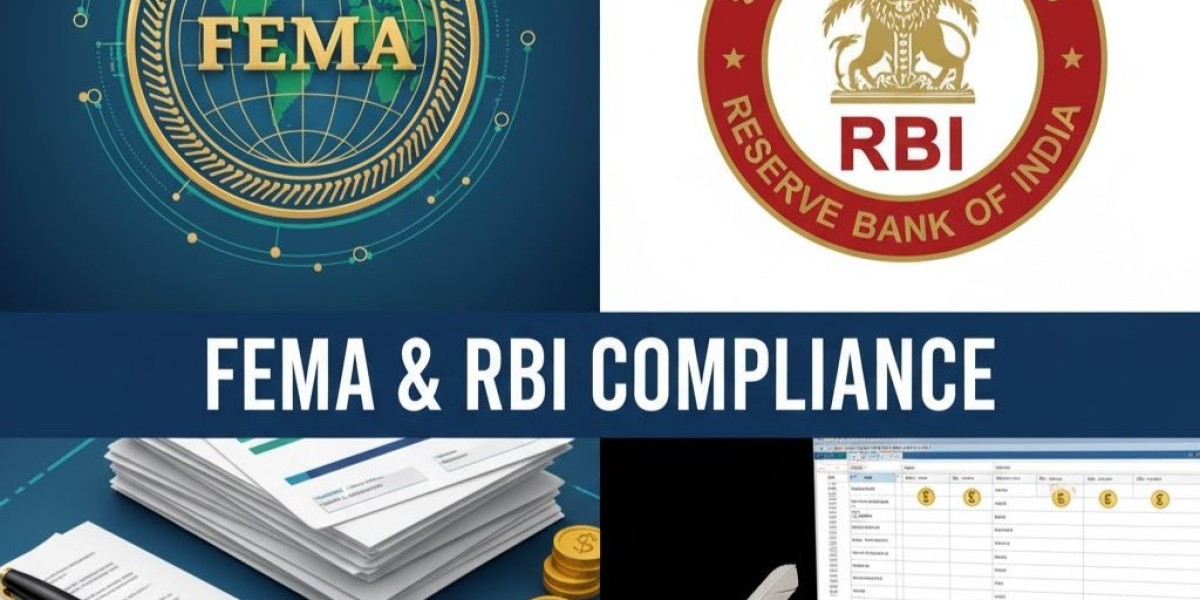Foreign investment plays a vital role in driving India’s economic growth, technological advancement, and employment generation. However, managing and reporting these investments involves strict adherence to the Reserve Bank of India (RBI) and the Foreign Exchange Management Act (FEMA) guidelines. Understanding RBI compliance for foreign investment is crucial for every company dealing with overseas investors or transactions. This blog by R Pareva & Company explains the key aspects, procedures, and importance of maintaining FEMA and RBI Compliance in India.
Understanding FEMA and RBI Compliance
The Foreign Exchange Management Act (FEMA) was enacted in 1999 to facilitate external trade, promote orderly development of the foreign exchange market, and maintain India’s balance of payments stability. The RBI regulates foreign exchange transactions through FEMA to ensure that foreign capital flows comply with Indian laws.
FEMA and RBI Compliance governs how businesses handle foreign direct investment (FDI), external commercial borrowings (ECB), overseas direct investments (ODI), and other foreign exchange transactions. Companies, whether Indian or foreign-owned, must comply with FEMA provisions and RBI regulations to avoid penalties, interest, or legal scrutiny.
FEMA and RBI Compliance in India: Key Regulations
In India, FEMA and the RBI together establish a legal and procedural framework for managing cross-border financial transactions. FEMA and RBI Compliance in India primarily focuses on:
Foreign Direct Investment (FDI):
Under the automatic or government approval routes, FDI is regulated through FEMA. Companies receiving FDI must report the inflow to RBI within prescribed timelines using forms like FC-GPR and FC-TRS.External Commercial Borrowings (ECB):
Indian entities can borrow funds from overseas lenders under specific conditions. RBI compliance involves filing ECB returns, adhering to interest rate caps, and maintaining repayment schedules.Overseas Direct Investment (ODI):
Indian companies investing abroad must comply with FEMA regulations related to capital structure, funding sources, and reporting of overseas investments through Form ODI.Remittance and Repatriation:
RBI monitors all cross-border remittances and repatriations to ensure funds are transferred legitimately and within the permissible limits under FEMA.
These regulations collectively ensure that every entity involved in international financial transactions follows a transparent and lawful procedure under FEMA Compliance in India.
RBI Compliance for Foreign Investment: Step-by-Step Guide
For businesses receiving or making foreign investments, following a structured approach to RBI compliance for foreign investment is essential. Below is a simplified stepwise guide:
Identify the Investment Route:
Determine whether the foreign investment falls under the automatic route (no prior approval required) or the government route (approval required through the relevant ministry).Valuation of Shares:
Shares issued to foreign investors must be valued as per RBI guidelines, typically following the Discounted Cash Flow (DCF) method, to ensure fairness and transparency.Reporting Inflows:
Upon receipt of foreign funds, companies must file the Advance Reporting Form within 30 days to notify the RBI of the inflow.Filing FC-GPR Form:
When shares or securities are issued to foreign investors, the company must file Form FC-GPR within 30 days of allotment.Annual Return on Foreign Liabilities and Assets (FLA):
Every company with foreign investment is required to file the FLA return annually by July 15, reporting all foreign assets and liabilities to RBI.Transfer of Shares (Form FC-TRS):
When shares are transferred between a resident and a non-resident, Form FC-TRS must be filed within 60 days of the transfer.
By adhering to these requirements, businesses maintain full RBI compliance for foreign investment and minimize legal or regulatory risks.
RBI Compliance for Private Limited Company
For a private limited company, foreign investment brings unique regulatory responsibilities. Under FEMA and RBI guidelines, these companies must follow specific compliance requirements to remain legally sound. Key aspects of RBI compliance for private limited company include:
Issuing Shares to Non-Residents:
Shares can be issued to foreign investors under FEMA, but valuation and pricing must comply with RBI norms.Timely Reporting:
All foreign transactions — from inflows to share allotments — must be reported to the RBI within defined timeframes.Maintenance of Records:
Detailed records of foreign investments, contracts, and communications with the RBI must be preserved for audit or verification.Sectoral Caps and Conditions:
Certain sectors have FDI limits (e.g., insurance, defense, real estate). Companies must confirm eligibility before accepting funds.
Non-compliance can lead to penalties, delays in investment processing, or restrictions on future transactions. Therefore, professional guidance on FEMA Compliance in India becomes indispensable for growing private enterprises.
FEMA Compliance in India: Importance for Businesses
FEMA Compliance in India ensures that all foreign exchange dealings are legal, traceable, and transparent. The benefits of strict compliance include:
Regulatory Security: Avoids penalties or legal disputes with RBI or enforcement agencies.
Investor Confidence: Builds credibility among foreign investors and partners.
Financial Transparency: Keeps transactions aligned with accounting and tax laws.
Operational Flexibility: Enables seamless remittance, repatriation, and reinvestment.
With the increase in cross-border business transactions, the need for accurate FEMA and RBI Compliance in India has become more crucial than ever.
Role of Professional Advisors in FEMA and RBI Compliance
Navigating the complex world of FEMA and RBI regulations can be challenging. Expert professionals help businesses interpret the law, prepare necessary documentation, and ensure accurate filings. Advisory firms like R Pareva & Company provide structured guidance and regulatory support for compliance across all aspects of foreign investment and exchange management.
R Pareva & Company focuses on delivering clarity, accuracy, and consistency in FEMA and RBI reporting. Their expertise ensures that companies maintain a compliant position with all required filings under RBI and FEMA frameworks, reducing regulatory risks and supporting long-term business stability.
Common FEMA and RBI Non-Compliance Issues
Some frequent areas where companies falter include:
Delay in filing FC-GPR or FLA returns
Non-reporting of share transfers between residents and non-residents
Improper valuation of shares during investment or exit
Unrecorded remittance receipts or repatriations
Misclassification of investment routes
Regular internal audits and expert consultation help prevent these compliance lapses, maintaining harmony with FEMA and RBI Compliance standards.
Conclusion
RBI compliance for foreign investment is a fundamental aspect of operating a globally connected business in India. It not only ensures legality and transparency but also strengthens investor trust and corporate reputation. Adhering to FEMA and RBI Compliance in India is essential for both Indian and foreign companies seeking to expand through lawful and efficient capital inflows.
With a professional approach and expert understanding of regulatory frameworks, R Pareva & Company assists businesses in managing FEMA Compliance in India, maintaining RBI compliance for private limited company, and ensuring full FEMA and RBI Compliance across all financial transactions.








